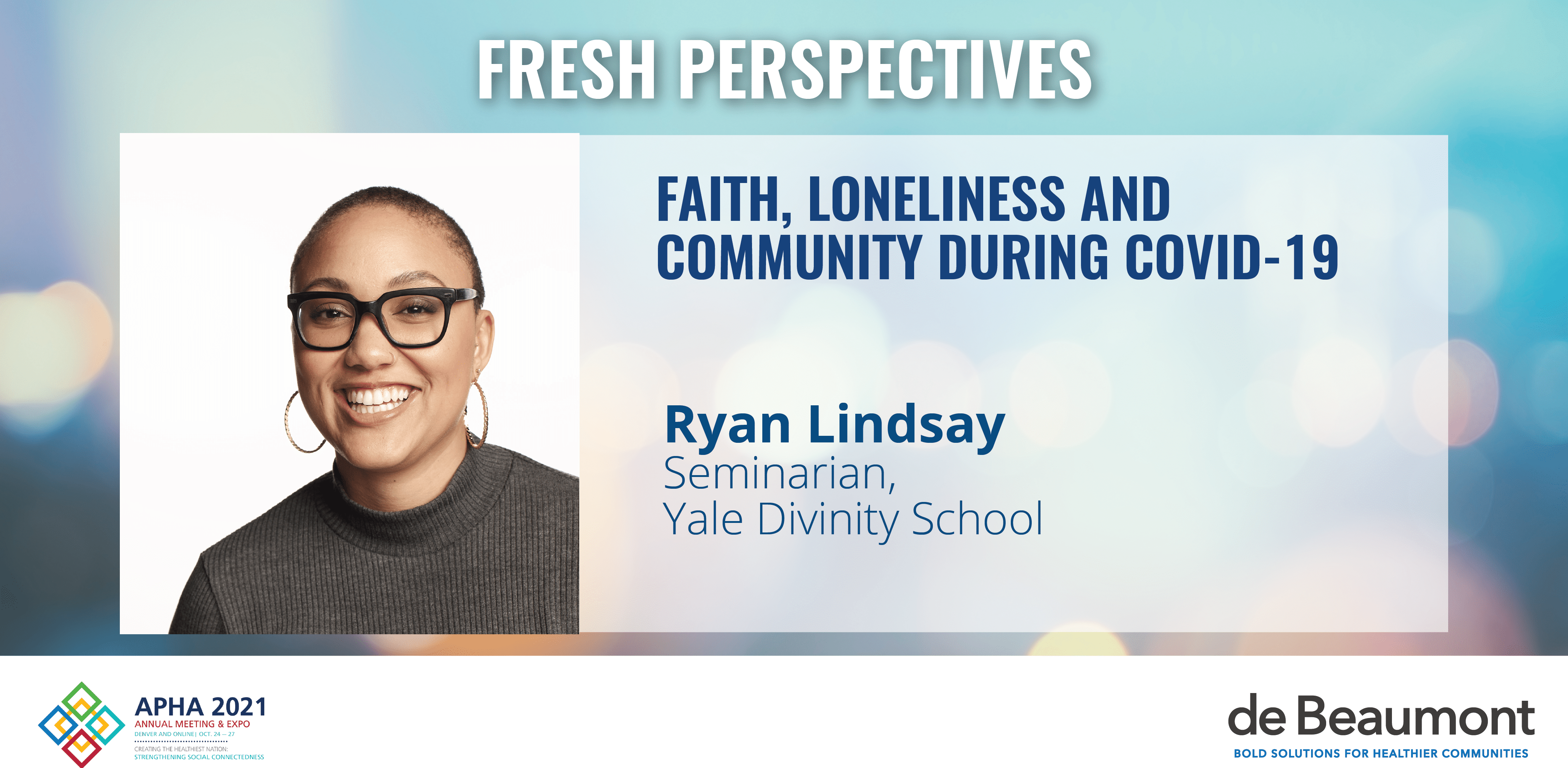The Fresh Perspectives series is presented by the de Beaumont Foundation. Published in the weeks leading up to APHA’s 2021 Annual Meeting and Expo in October, the series showcases viewpoints from a range of public health advocates.
Today’s guest author is Ryan Lindsay, a student at Yale Divinity School’s Andover Newton Seminary, who interned as a chaplain this summer at Saint Francis Hospital in Hartford, Connecticut. Formerly an award-winning journalist, Ryan still writes while pursuing preaching opportunities. Her first book, “Mine The Unseen,” comes out this year.
It’s March 2020, and COVID-19 is on the brink of upending our lives in the U.S. I’m at the airport and one of the few people wearing a mask. I’m headed home to see my family, with no idea it will be the last time I see them in months.
It wasn’t so bad at first, but then the loneliness set in. And the quiet. In Hartford, the quiet was mornings working from home without the echoes of traffic on the nearby highway or of school buses driving by. Yet it was also punctuated by sirens, lots of them.
Within the walls of my apartment, in the quiet, God began to reveal things to me about myself, things I wouldn’t otherwise have realized if the world had not come to a screeching halt. Church folk call these revelations, and I came to appreciate those days.
But there were other days where I was desperate to go somewhere.
One day, I drove 40 minutes to a state park, only to be met by police. I was wearing a shirt I created that listed Black brothers killed mainly by police. The murder of George Floyd was on my mind.
One of the officers told me the park was at capacity, but that there was another one nearby. So I drove there and soon found myself wandering through woods and coming upon the Housatonic River. I was comforted in the presence of the waters.
I spent most of 2020 alone, documenting that time using my Fujifilm instant camera. I also spent my first year at Yale Divinity School taking virtual classes. I missed the magic of bodies and spirits in the same place.
When I arrived at Saint Francis Hospital in Hartford as a chaplain intern this summer, I felt relieved to be around people again. My loneliness began to fade. I felt useful in the hospital, offering a listening ear, words of encouragement or a prayer for patients enduring the most vulnerable moments of their lives.
Being alone in a hospital room, with medical machinery beeping and buzzing, ushers in a particular type of loneliness. Sometimes, I sat with a patient hospitalized for alcohol withdrawal for over an hour. Other times, I racked my brain thinking what I could do to comfort grieving families.
One day, I rushed to the spiritual care office to grab a handful of rosaries for a large family gathered to say goodbye to their matriarch. And on the late nights that turned into early mornings, sitting with patients who’d died awful deaths in the ER or ICU, I often asked God, “Why?” And yet I thanked God for a place to disrupt my loneliness.
In July, I traveled to Vermont for the first time to preach to a small congregation of mostly folks over 60. Word was that a 90-year-old woman there made donuts from scratch for the church’s post-service coffee hour. The place radiated excitement.
On that day, I felt the warmth of those grateful to be back together in a sacred space, singing songs of praise and listening to the word that God put on my heart to share. Here, in the sanctuary, we weren’t alone. Here, we were seen by each other and by God. Here, our loneliness had to flee.
Rejoicing in this space was possible because of the sacrifices we made for one another. The isolation we endured was not in vain, as we held on to hope in the midst of our loneliness for the greater good — to gather once again. It is my hope that more communities will experience this same sense of peace and security by looking out for one another.
I believe that because of God, we’re never truly alone. And I also believe that we can still experience profound loneliness. It’s a paradox that’s been amplified throughout the pandemic, one that must be acknowledged, wrestled with, surrendered to. Then, loneliness must be told that it can no longer take up space in our homes or our heads or our hearts, so that we can begin to breathe life once again into ourselves and our communities.
APHA’s 2021 Annual Meeting and Expo is focused on “Creating the Healthiest Nation: Social Connectedness.” Make plans to connect with APHA and the de Beaumont Foundation during the meeting’s Oct. 26 Sunset Tweetup.
This blog post was first published on APHA’s Public Health Newswire.





